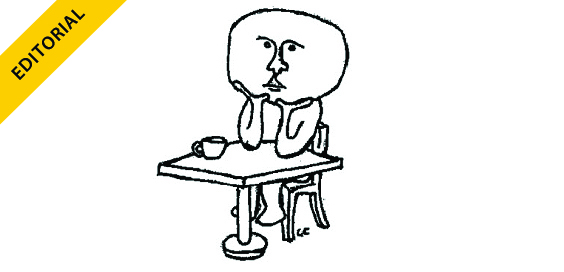Editorial: cynicism and hope

File photo
We are well-trained in cynicism these days. We expect promises from on high to be broken, whether they’re from politicians, pastors or college presidents. We’re suspicious of anyone who asks us to trust them. If we don’t see, we don’t believe.
Cynicism, we believe, is wisdom. It’s healthy and right because it meets the world head-on without blinking its eyes. It doesn’t shy away from the dark things in the world and how they bring shadows into our lives. It can confront racism and greed and just plain bad luck because it expects them. It plans on the worst and therefore can never be disappointed. It’s safe.
This worldview comes in handy sometimes. In his essay “The Braindead Megaphone,” George Saunders unblinkingly explains the lay of our political land—controlled by loud voices that dominate because they are loud, not because they have anything particularly intelligent to say. In fact, the holders of these megaphones constantly sacrifice nuance and detail for another few decibels.
Now more than ever, we need this cynical view of political voices. We need perceptive people like Saunders to tell us over and over again that the voices coming out of the megaphones are hollow. But if this is all we hear, if we only expect more and more empty shouting, then that’s all we’re going to get.
Saunders’ solution to all this braindead shouting?
“This battle, like any great battle, will be won, if won, not with some easy corrective tidal wave of Total Righteousness, but with small drops of specificity and aplomb and correct logic, delivered titrationally, by many of us all at once.”
This is cynicism tempered by hope. It sees the world as the volume-dominated place it is and imagines the one possible way it could change. It calls on those who share Saunders’ cynical view of politics to take action not by picking up their own megaphones and adding to the din but by speaking gracefully and accurately at whatever volume they can.
Saunders, and those who take his advice, really do meet the world head-on. They have the courage both to see what’s wrong in the world and to imagine it otherwise. It is when we can’t do that imaginative work, when we can only brace ourselves for the worst, that cynicism triumphs over hope.
We don’t need to leave campus or even open Facebook to find fuel for cynicism. Calvin’s supposed commitments to anti-racism, to safe spaces, to the liberal arts, and to biblical orthodoxy all seem fragile and inconsistent depending on who you ask. We’re hurt by selfish friends, hypocritical churches and parents who are too distant or the exact opposite. We’re discouraged by our own mistakes and failures. Before long, all this disappointment and pain becomes normal, and we expect it. We become cynical.
But let’s temper our cynicism with concrete, realistic hope. And as Saunders writes, that hope must come from “many of us all at once.” Some of it comes from remembering and celebrating the times when things go the right way, but most of it comes from people who care consistently and ardently about justice, music, art, tradition, inclusion, change and love.
The best answer to the blaring megaphones is not the noise-canceling earphones of cynicism nor the loudspeaker of unrealistic optimism. Instead, it’s the roar of many voices speaking naturally, unamplified, and it’s the hopeful silence of listening.



Tammi Spayde • Feb 19, 2018 at 9:19 am
God is the source of all hope. Without Him, our works are vain attempts at righteousness. Your editorial brings to mind this truth: If I speak in the tongues of men or of angels, but do not have love, I am only a resounding gong or a clanging symbol. Love is patient, love is kind. It does not envy, it does not boast, it is not proud. It does not dishonor others, it is not self-seeking, it is not easily angered, it keeps no record of wrongs. (1 Corinthians 13:1 and 4-5) This is how we know what love is: Jesus Christ laid down his life for us. (1 John 3:16a).